Analyzing CSR: A Detailed Report on Corporate Social Responsibility
VerifiedAdded on 2023/06/18
|7
|1990
|201
Report
AI Summary
This report provides an overview of Corporate Social Responsibility (CSR) and its significance in the context of business law and ethics. It highlights the role of CSR in promoting ethical behavior, sustainable development, and positive impacts on the workplace, market space, community, supply chain, and public policies. The report discusses how CSR activities align with international standards, enhance employee satisfaction, improve public image, and foster consumer loyalty. It also examines the four major categories of CSR: environmental, philanthropic, economic, and ethical responsibilities. The report concludes that CSR is valuable for attracting talent, managing risks, increasing brand value, and differentiating companies in a competitive market, emphasizing its role in creating a more productive and positive work environment.
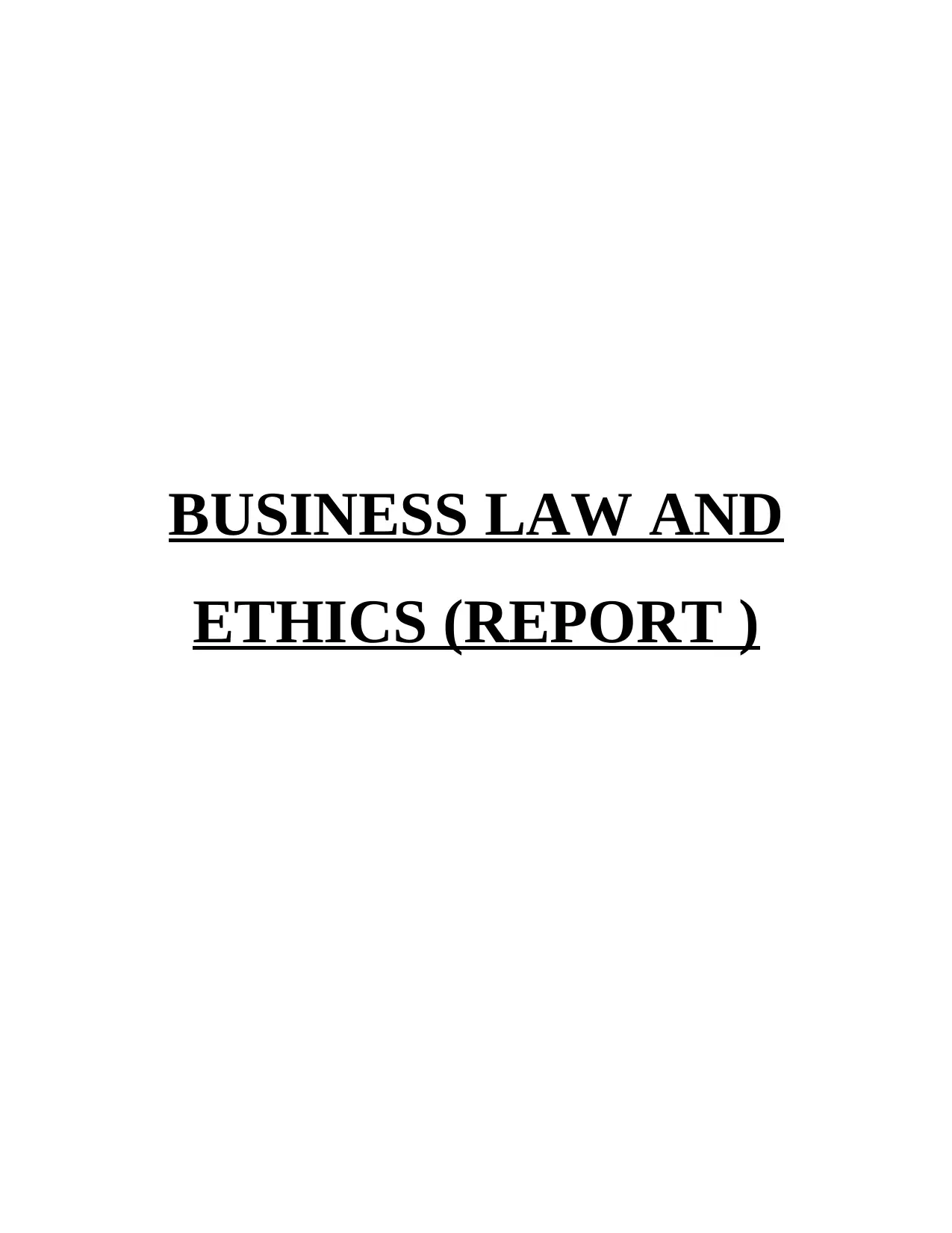
BUSINESS LAW AND
ETHICS (REPORT )
ETHICS (REPORT )
Paraphrase This Document
Need a fresh take? Get an instant paraphrase of this document with our AI Paraphraser
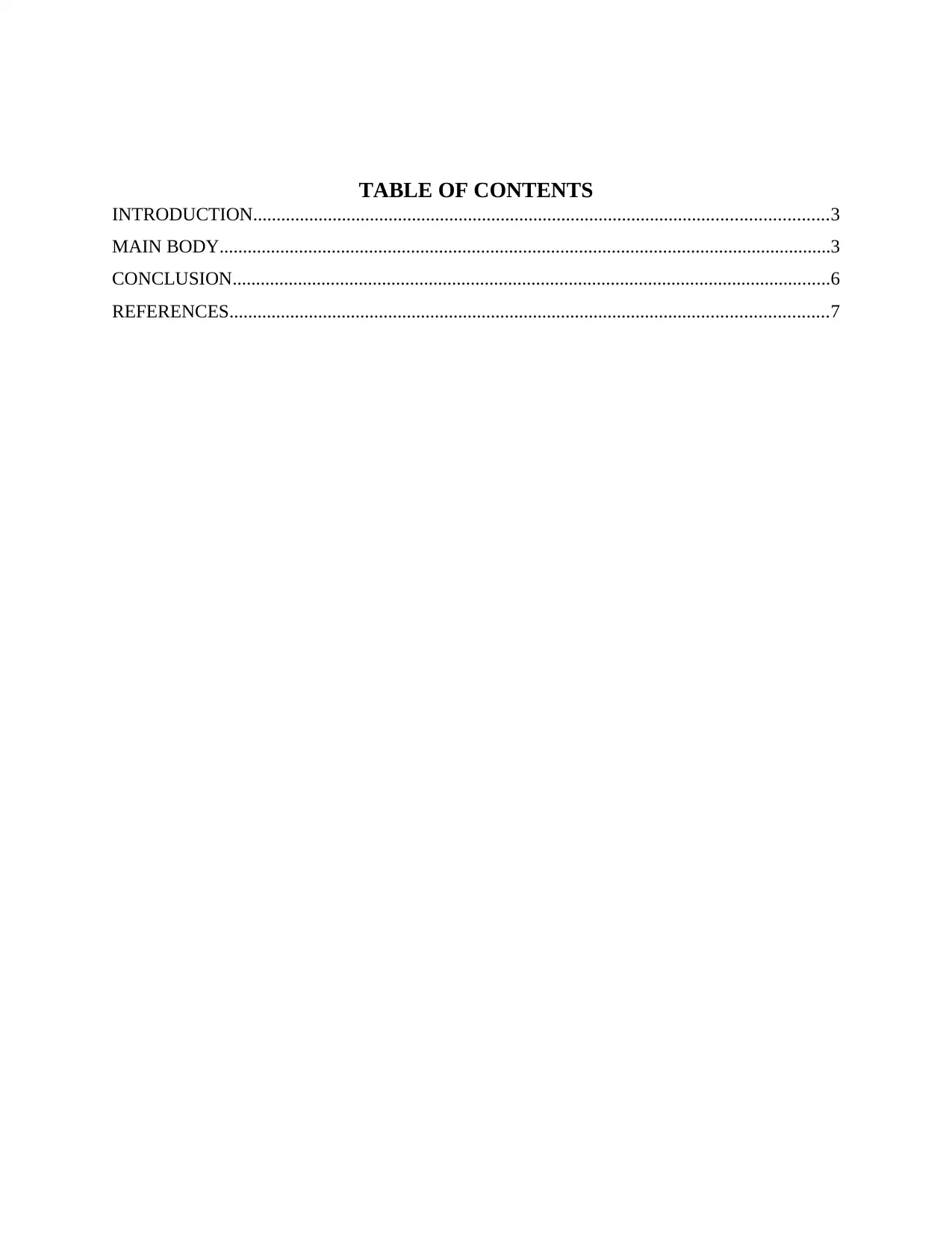
TABLE OF CONTENTS
INTRODUCTION...........................................................................................................................3
MAIN BODY...................................................................................................................................3
CONCLUSION................................................................................................................................6
REFERENCES................................................................................................................................7
INTRODUCTION...........................................................................................................................3
MAIN BODY...................................................................................................................................3
CONCLUSION................................................................................................................................6
REFERENCES................................................................................................................................7
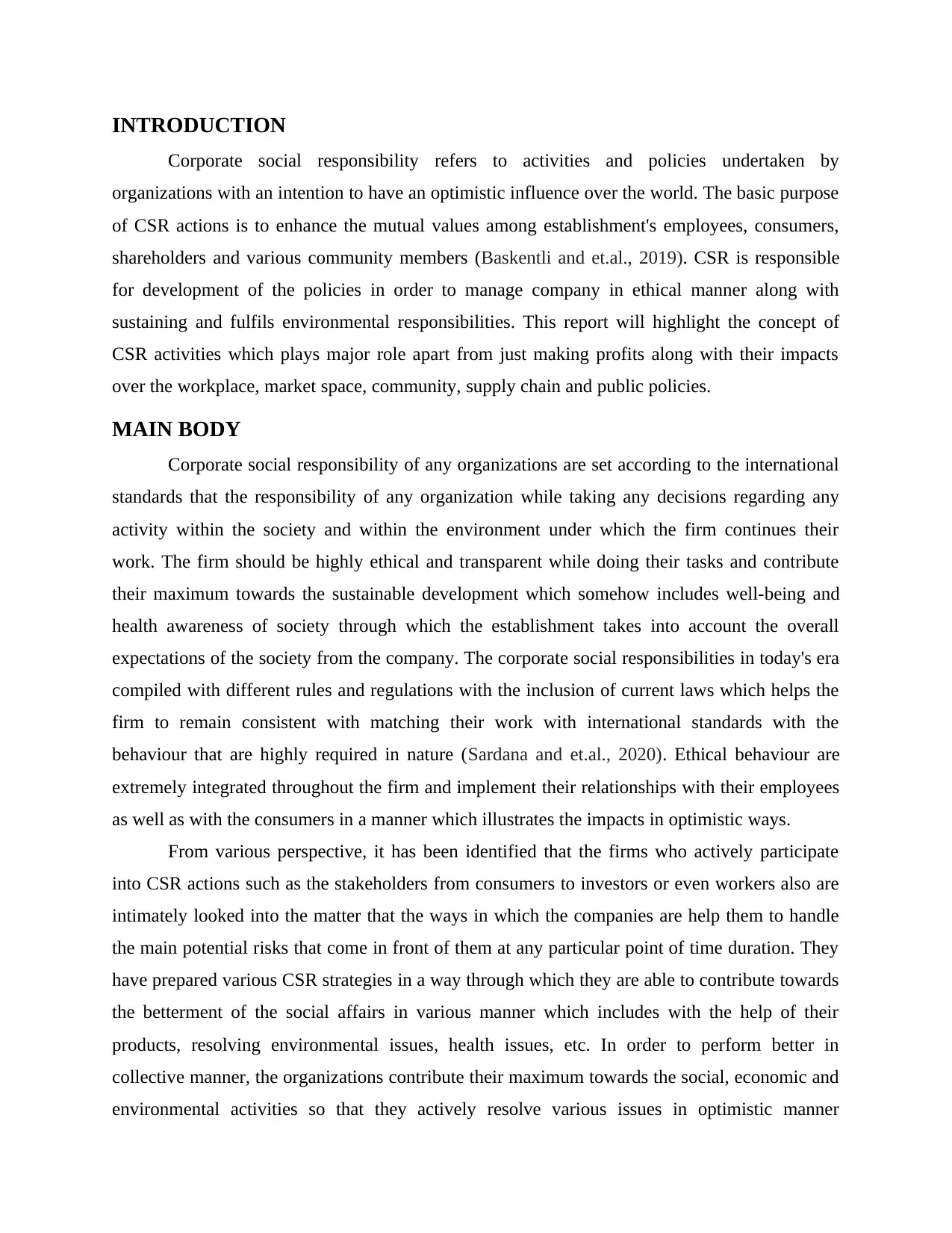
INTRODUCTION
Corporate social responsibility refers to activities and policies undertaken by
organizations with an intention to have an optimistic influence over the world. The basic purpose
of CSR actions is to enhance the mutual values among establishment's employees, consumers,
shareholders and various community members (Baskentli and et.al., 2019). CSR is responsible
for development of the policies in order to manage company in ethical manner along with
sustaining and fulfils environmental responsibilities. This report will highlight the concept of
CSR activities which plays major role apart from just making profits along with their impacts
over the workplace, market space, community, supply chain and public policies.
MAIN BODY
Corporate social responsibility of any organizations are set according to the international
standards that the responsibility of any organization while taking any decisions regarding any
activity within the society and within the environment under which the firm continues their
work. The firm should be highly ethical and transparent while doing their tasks and contribute
their maximum towards the sustainable development which somehow includes well-being and
health awareness of society through which the establishment takes into account the overall
expectations of the society from the company. The corporate social responsibilities in today's era
compiled with different rules and regulations with the inclusion of current laws which helps the
firm to remain consistent with matching their work with international standards with the
behaviour that are highly required in nature (Sardana and et.al., 2020). Ethical behaviour are
extremely integrated throughout the firm and implement their relationships with their employees
as well as with the consumers in a manner which illustrates the impacts in optimistic ways.
From various perspective, it has been identified that the firms who actively participate
into CSR actions such as the stakeholders from consumers to investors or even workers also are
intimately looked into the matter that the ways in which the companies are help them to handle
the main potential risks that come in front of them at any particular point of time duration. They
have prepared various CSR strategies in a way through which they are able to contribute towards
the betterment of the social affairs in various manner which includes with the help of their
products, resolving environmental issues, health issues, etc. In order to perform better in
collective manner, the organizations contribute their maximum towards the social, economic and
environmental activities so that they actively resolve various issues in optimistic manner
Corporate social responsibility refers to activities and policies undertaken by
organizations with an intention to have an optimistic influence over the world. The basic purpose
of CSR actions is to enhance the mutual values among establishment's employees, consumers,
shareholders and various community members (Baskentli and et.al., 2019). CSR is responsible
for development of the policies in order to manage company in ethical manner along with
sustaining and fulfils environmental responsibilities. This report will highlight the concept of
CSR activities which plays major role apart from just making profits along with their impacts
over the workplace, market space, community, supply chain and public policies.
MAIN BODY
Corporate social responsibility of any organizations are set according to the international
standards that the responsibility of any organization while taking any decisions regarding any
activity within the society and within the environment under which the firm continues their
work. The firm should be highly ethical and transparent while doing their tasks and contribute
their maximum towards the sustainable development which somehow includes well-being and
health awareness of society through which the establishment takes into account the overall
expectations of the society from the company. The corporate social responsibilities in today's era
compiled with different rules and regulations with the inclusion of current laws which helps the
firm to remain consistent with matching their work with international standards with the
behaviour that are highly required in nature (Sardana and et.al., 2020). Ethical behaviour are
extremely integrated throughout the firm and implement their relationships with their employees
as well as with the consumers in a manner which illustrates the impacts in optimistic ways.
From various perspective, it has been identified that the firms who actively participate
into CSR actions such as the stakeholders from consumers to investors or even workers also are
intimately looked into the matter that the ways in which the companies are help them to handle
the main potential risks that come in front of them at any particular point of time duration. They
have prepared various CSR strategies in a way through which they are able to contribute towards
the betterment of the social affairs in various manner which includes with the help of their
products, resolving environmental issues, health issues, etc. In order to perform better in
collective manner, the organizations contribute their maximum towards the social, economic and
environmental activities so that they actively resolve various issues in optimistic manner
⊘ This is a preview!⊘
Do you want full access?
Subscribe today to unlock all pages.

Trusted by 1+ million students worldwide
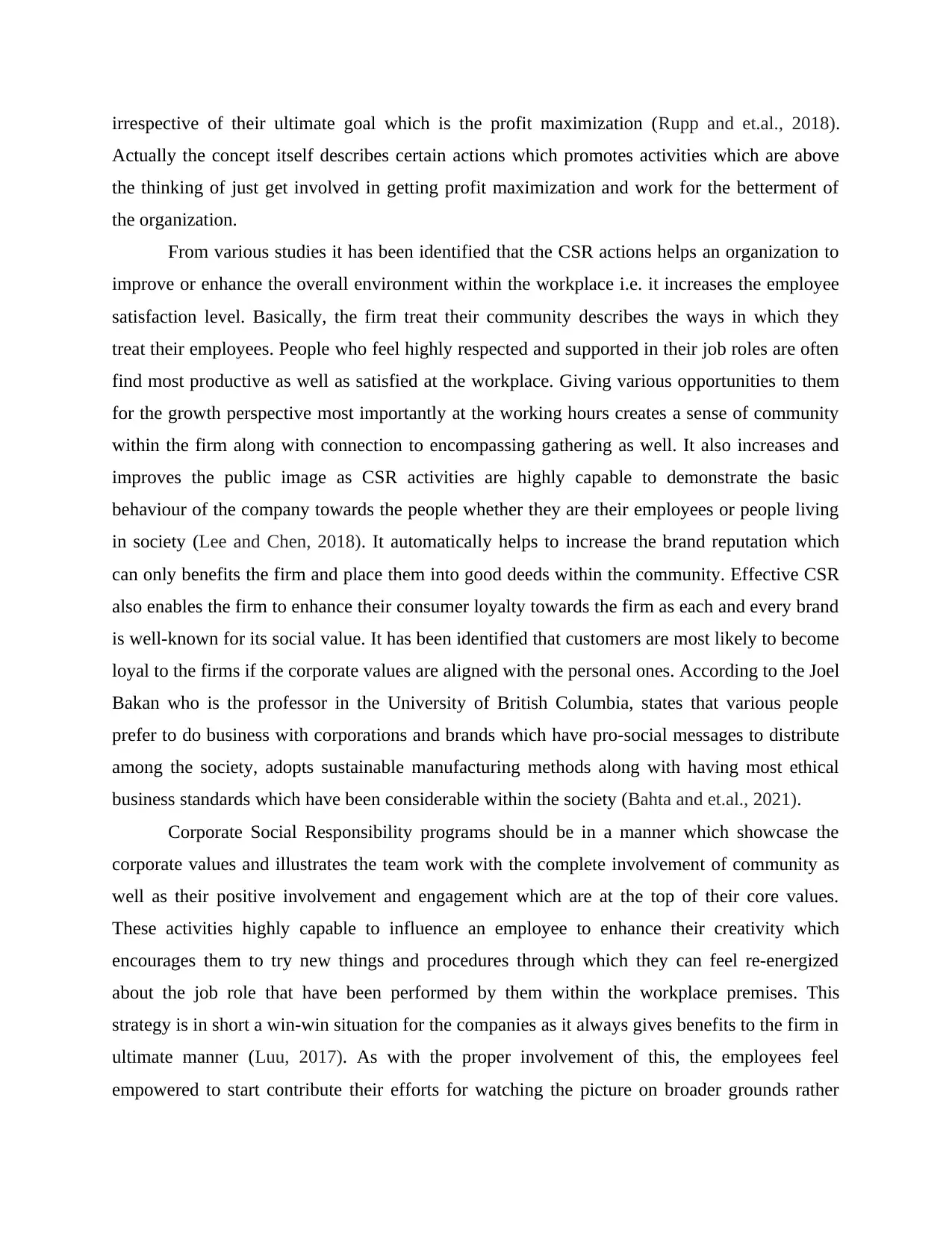
irrespective of their ultimate goal which is the profit maximization (Rupp and et.al., 2018).
Actually the concept itself describes certain actions which promotes activities which are above
the thinking of just get involved in getting profit maximization and work for the betterment of
the organization.
From various studies it has been identified that the CSR actions helps an organization to
improve or enhance the overall environment within the workplace i.e. it increases the employee
satisfaction level. Basically, the firm treat their community describes the ways in which they
treat their employees. People who feel highly respected and supported in their job roles are often
find most productive as well as satisfied at the workplace. Giving various opportunities to them
for the growth perspective most importantly at the working hours creates a sense of community
within the firm along with connection to encompassing gathering as well. It also increases and
improves the public image as CSR activities are highly capable to demonstrate the basic
behaviour of the company towards the people whether they are their employees or people living
in society (Lee and Chen, 2018). It automatically helps to increase the brand reputation which
can only benefits the firm and place them into good deeds within the community. Effective CSR
also enables the firm to enhance their consumer loyalty towards the firm as each and every brand
is well-known for its social value. It has been identified that customers are most likely to become
loyal to the firms if the corporate values are aligned with the personal ones. According to the Joel
Bakan who is the professor in the University of British Columbia, states that various people
prefer to do business with corporations and brands which have pro-social messages to distribute
among the society, adopts sustainable manufacturing methods along with having most ethical
business standards which have been considerable within the society (Bahta and et.al., 2021).
Corporate Social Responsibility programs should be in a manner which showcase the
corporate values and illustrates the team work with the complete involvement of community as
well as their positive involvement and engagement which are at the top of their core values.
These activities highly capable to influence an employee to enhance their creativity which
encourages them to try new things and procedures through which they can feel re-energized
about the job role that have been performed by them within the workplace premises. This
strategy is in short a win-win situation for the companies as it always gives benefits to the firm in
ultimate manner (Luu, 2017). As with the proper involvement of this, the employees feel
empowered to start contribute their efforts for watching the picture on broader grounds rather
Actually the concept itself describes certain actions which promotes activities which are above
the thinking of just get involved in getting profit maximization and work for the betterment of
the organization.
From various studies it has been identified that the CSR actions helps an organization to
improve or enhance the overall environment within the workplace i.e. it increases the employee
satisfaction level. Basically, the firm treat their community describes the ways in which they
treat their employees. People who feel highly respected and supported in their job roles are often
find most productive as well as satisfied at the workplace. Giving various opportunities to them
for the growth perspective most importantly at the working hours creates a sense of community
within the firm along with connection to encompassing gathering as well. It also increases and
improves the public image as CSR activities are highly capable to demonstrate the basic
behaviour of the company towards the people whether they are their employees or people living
in society (Lee and Chen, 2018). It automatically helps to increase the brand reputation which
can only benefits the firm and place them into good deeds within the community. Effective CSR
also enables the firm to enhance their consumer loyalty towards the firm as each and every brand
is well-known for its social value. It has been identified that customers are most likely to become
loyal to the firms if the corporate values are aligned with the personal ones. According to the Joel
Bakan who is the professor in the University of British Columbia, states that various people
prefer to do business with corporations and brands which have pro-social messages to distribute
among the society, adopts sustainable manufacturing methods along with having most ethical
business standards which have been considerable within the society (Bahta and et.al., 2021).
Corporate Social Responsibility programs should be in a manner which showcase the
corporate values and illustrates the team work with the complete involvement of community as
well as their positive involvement and engagement which are at the top of their core values.
These activities highly capable to influence an employee to enhance their creativity which
encourages them to try new things and procedures through which they can feel re-energized
about the job role that have been performed by them within the workplace premises. This
strategy is in short a win-win situation for the companies as it always gives benefits to the firm in
ultimate manner (Luu, 2017). As with the proper involvement of this, the employees feel
empowered to start contribute their efforts for watching the picture on broader grounds rather
Paraphrase This Document
Need a fresh take? Get an instant paraphrase of this document with our AI Paraphraser
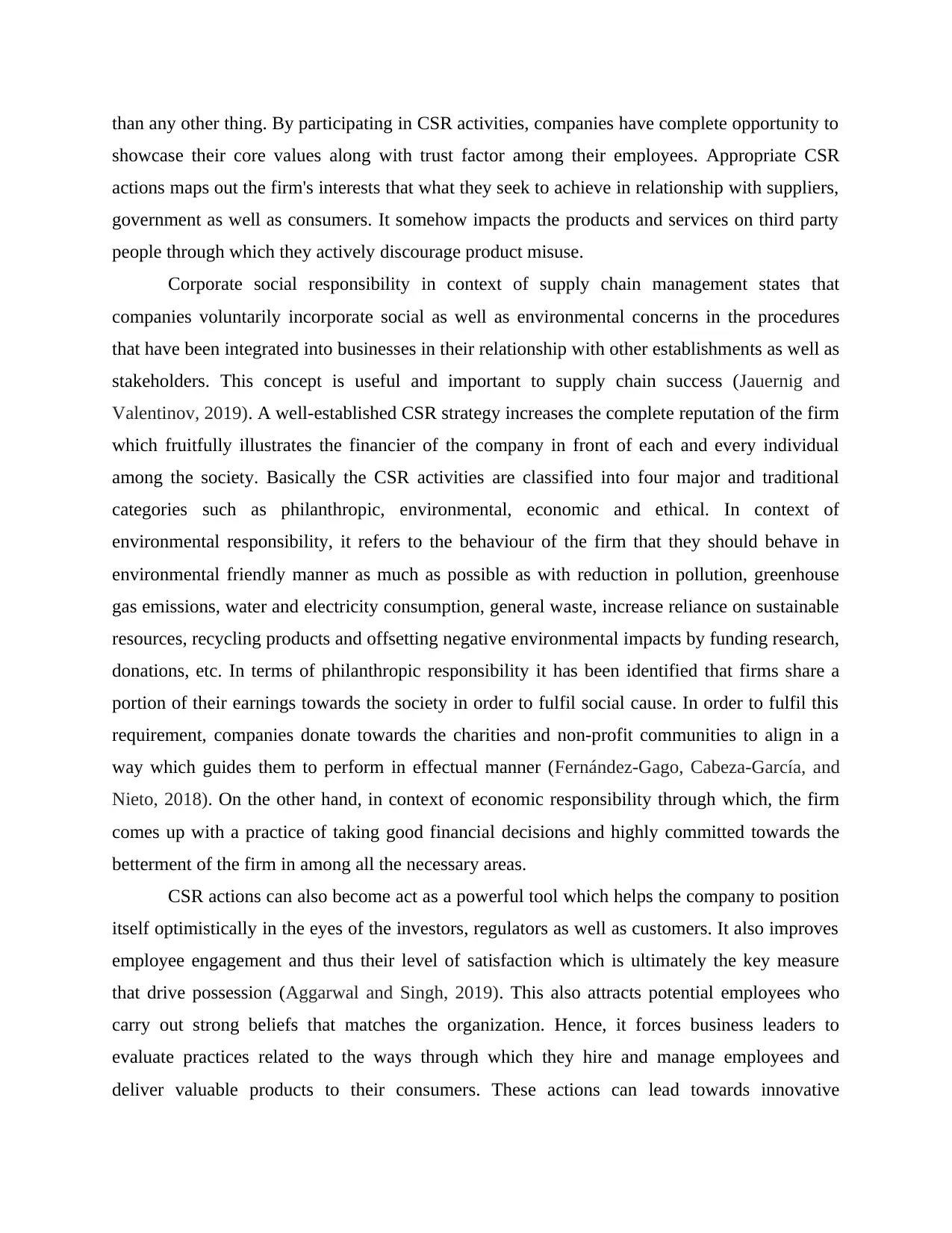
than any other thing. By participating in CSR activities, companies have complete opportunity to
showcase their core values along with trust factor among their employees. Appropriate CSR
actions maps out the firm's interests that what they seek to achieve in relationship with suppliers,
government as well as consumers. It somehow impacts the products and services on third party
people through which they actively discourage product misuse.
Corporate social responsibility in context of supply chain management states that
companies voluntarily incorporate social as well as environmental concerns in the procedures
that have been integrated into businesses in their relationship with other establishments as well as
stakeholders. This concept is useful and important to supply chain success (Jauernig and
Valentinov, 2019). A well-established CSR strategy increases the complete reputation of the firm
which fruitfully illustrates the financier of the company in front of each and every individual
among the society. Basically the CSR activities are classified into four major and traditional
categories such as philanthropic, environmental, economic and ethical. In context of
environmental responsibility, it refers to the behaviour of the firm that they should behave in
environmental friendly manner as much as possible as with reduction in pollution, greenhouse
gas emissions, water and electricity consumption, general waste, increase reliance on sustainable
resources, recycling products and offsetting negative environmental impacts by funding research,
donations, etc. In terms of philanthropic responsibility it has been identified that firms share a
portion of their earnings towards the society in order to fulfil social cause. In order to fulfil this
requirement, companies donate towards the charities and non-profit communities to align in a
way which guides them to perform in effectual manner (Fernández‐Gago, Cabeza‐García, and
Nieto, 2018). On the other hand, in context of economic responsibility through which, the firm
comes up with a practice of taking good financial decisions and highly committed towards the
betterment of the firm in among all the necessary areas.
CSR actions can also become act as a powerful tool which helps the company to position
itself optimistically in the eyes of the investors, regulators as well as customers. It also improves
employee engagement and thus their level of satisfaction which is ultimately the key measure
that drive possession (Aggarwal and Singh, 2019). This also attracts potential employees who
carry out strong beliefs that matches the organization. Hence, it forces business leaders to
evaluate practices related to the ways through which they hire and manage employees and
deliver valuable products to their consumers. These actions can lead towards innovative
showcase their core values along with trust factor among their employees. Appropriate CSR
actions maps out the firm's interests that what they seek to achieve in relationship with suppliers,
government as well as consumers. It somehow impacts the products and services on third party
people through which they actively discourage product misuse.
Corporate social responsibility in context of supply chain management states that
companies voluntarily incorporate social as well as environmental concerns in the procedures
that have been integrated into businesses in their relationship with other establishments as well as
stakeholders. This concept is useful and important to supply chain success (Jauernig and
Valentinov, 2019). A well-established CSR strategy increases the complete reputation of the firm
which fruitfully illustrates the financier of the company in front of each and every individual
among the society. Basically the CSR activities are classified into four major and traditional
categories such as philanthropic, environmental, economic and ethical. In context of
environmental responsibility, it refers to the behaviour of the firm that they should behave in
environmental friendly manner as much as possible as with reduction in pollution, greenhouse
gas emissions, water and electricity consumption, general waste, increase reliance on sustainable
resources, recycling products and offsetting negative environmental impacts by funding research,
donations, etc. In terms of philanthropic responsibility it has been identified that firms share a
portion of their earnings towards the society in order to fulfil social cause. In order to fulfil this
requirement, companies donate towards the charities and non-profit communities to align in a
way which guides them to perform in effectual manner (Fernández‐Gago, Cabeza‐García, and
Nieto, 2018). On the other hand, in context of economic responsibility through which, the firm
comes up with a practice of taking good financial decisions and highly committed towards the
betterment of the firm in among all the necessary areas.
CSR actions can also become act as a powerful tool which helps the company to position
itself optimistically in the eyes of the investors, regulators as well as customers. It also improves
employee engagement and thus their level of satisfaction which is ultimately the key measure
that drive possession (Aggarwal and Singh, 2019). This also attracts potential employees who
carry out strong beliefs that matches the organization. Hence, it forces business leaders to
evaluate practices related to the ways through which they hire and manage employees and
deliver valuable products to their consumers. These actions can lead towards innovative
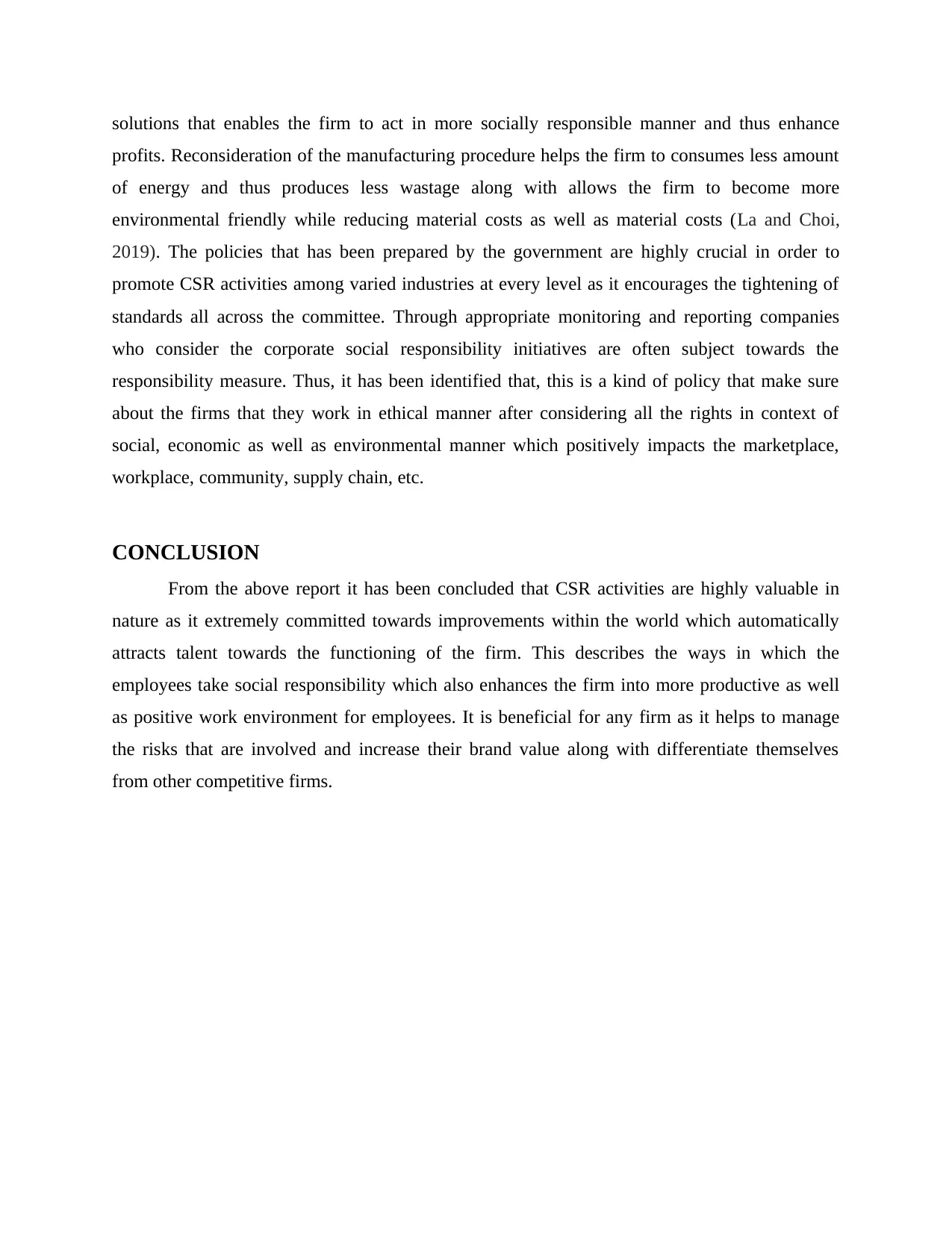
solutions that enables the firm to act in more socially responsible manner and thus enhance
profits. Reconsideration of the manufacturing procedure helps the firm to consumes less amount
of energy and thus produces less wastage along with allows the firm to become more
environmental friendly while reducing material costs as well as material costs (La and Choi,
2019). The policies that has been prepared by the government are highly crucial in order to
promote CSR activities among varied industries at every level as it encourages the tightening of
standards all across the committee. Through appropriate monitoring and reporting companies
who consider the corporate social responsibility initiatives are often subject towards the
responsibility measure. Thus, it has been identified that, this is a kind of policy that make sure
about the firms that they work in ethical manner after considering all the rights in context of
social, economic as well as environmental manner which positively impacts the marketplace,
workplace, community, supply chain, etc.
CONCLUSION
From the above report it has been concluded that CSR activities are highly valuable in
nature as it extremely committed towards improvements within the world which automatically
attracts talent towards the functioning of the firm. This describes the ways in which the
employees take social responsibility which also enhances the firm into more productive as well
as positive work environment for employees. It is beneficial for any firm as it helps to manage
the risks that are involved and increase their brand value along with differentiate themselves
from other competitive firms.
profits. Reconsideration of the manufacturing procedure helps the firm to consumes less amount
of energy and thus produces less wastage along with allows the firm to become more
environmental friendly while reducing material costs as well as material costs (La and Choi,
2019). The policies that has been prepared by the government are highly crucial in order to
promote CSR activities among varied industries at every level as it encourages the tightening of
standards all across the committee. Through appropriate monitoring and reporting companies
who consider the corporate social responsibility initiatives are often subject towards the
responsibility measure. Thus, it has been identified that, this is a kind of policy that make sure
about the firms that they work in ethical manner after considering all the rights in context of
social, economic as well as environmental manner which positively impacts the marketplace,
workplace, community, supply chain, etc.
CONCLUSION
From the above report it has been concluded that CSR activities are highly valuable in
nature as it extremely committed towards improvements within the world which automatically
attracts talent towards the functioning of the firm. This describes the ways in which the
employees take social responsibility which also enhances the firm into more productive as well
as positive work environment for employees. It is beneficial for any firm as it helps to manage
the risks that are involved and increase their brand value along with differentiate themselves
from other competitive firms.
⊘ This is a preview!⊘
Do you want full access?
Subscribe today to unlock all pages.

Trusted by 1+ million students worldwide
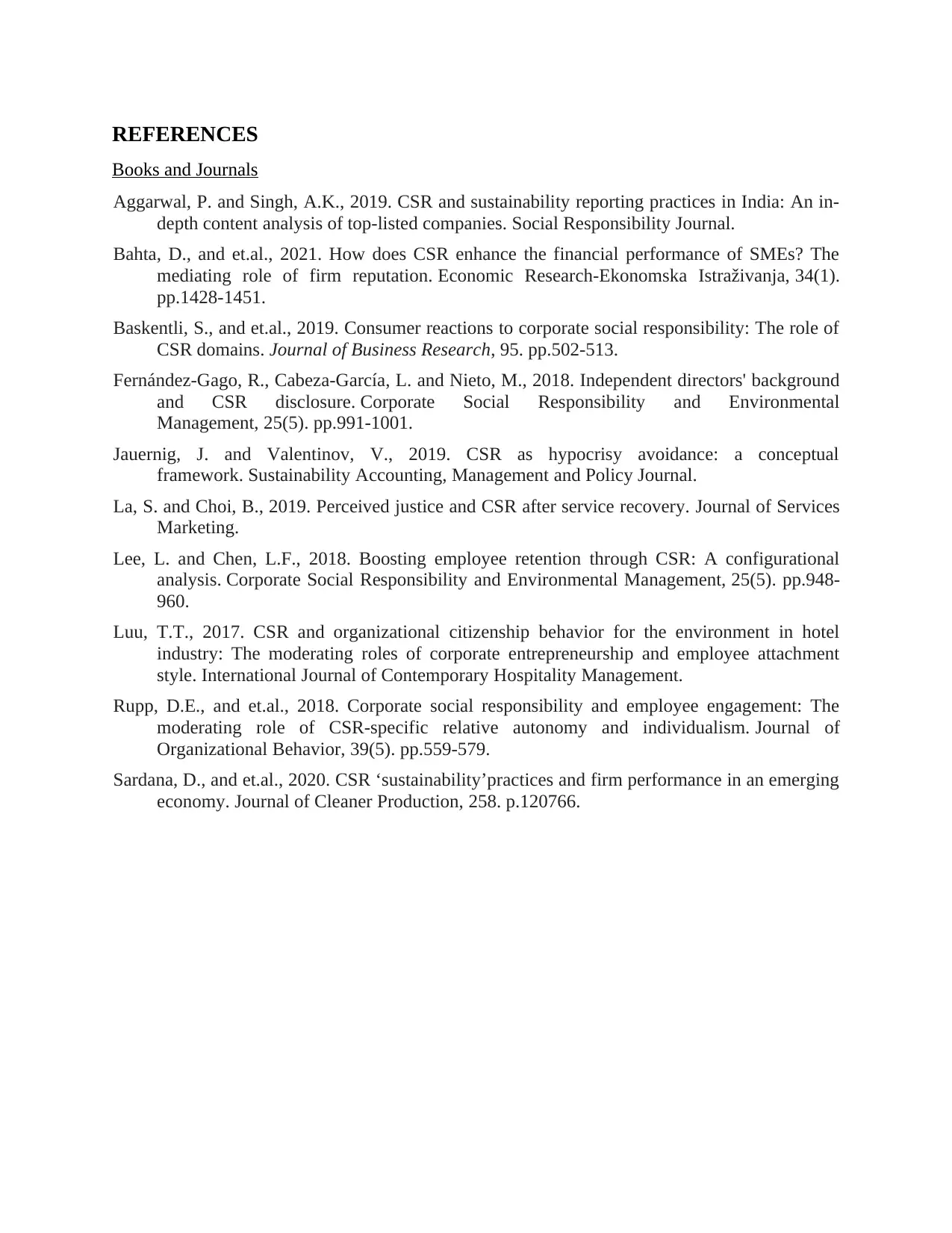
REFERENCES
Books and Journals
Aggarwal, P. and Singh, A.K., 2019. CSR and sustainability reporting practices in India: An in-
depth content analysis of top-listed companies. Social Responsibility Journal.
Bahta, D., and et.al., 2021. How does CSR enhance the financial performance of SMEs? The
mediating role of firm reputation. Economic Research-Ekonomska Istraživanja, 34(1).
pp.1428-1451.
Baskentli, S., and et.al., 2019. Consumer reactions to corporate social responsibility: The role of
CSR domains. Journal of Business Research, 95. pp.502-513.
Fernández‐Gago, R., Cabeza‐García, L. and Nieto, M., 2018. Independent directors' background
and CSR disclosure. Corporate Social Responsibility and Environmental
Management, 25(5). pp.991-1001.
Jauernig, J. and Valentinov, V., 2019. CSR as hypocrisy avoidance: a conceptual
framework. Sustainability Accounting, Management and Policy Journal.
La, S. and Choi, B., 2019. Perceived justice and CSR after service recovery. Journal of Services
Marketing.
Lee, L. and Chen, L.F., 2018. Boosting employee retention through CSR: A configurational
analysis. Corporate Social Responsibility and Environmental Management, 25(5). pp.948-
960.
Luu, T.T., 2017. CSR and organizational citizenship behavior for the environment in hotel
industry: The moderating roles of corporate entrepreneurship and employee attachment
style. International Journal of Contemporary Hospitality Management.
Rupp, D.E., and et.al., 2018. Corporate social responsibility and employee engagement: The
moderating role of CSR‐specific relative autonomy and individualism. Journal of
Organizational Behavior, 39(5). pp.559-579.
Sardana, D., and et.al., 2020. CSR ‘sustainability’practices and firm performance in an emerging
economy. Journal of Cleaner Production, 258. p.120766.
Books and Journals
Aggarwal, P. and Singh, A.K., 2019. CSR and sustainability reporting practices in India: An in-
depth content analysis of top-listed companies. Social Responsibility Journal.
Bahta, D., and et.al., 2021. How does CSR enhance the financial performance of SMEs? The
mediating role of firm reputation. Economic Research-Ekonomska Istraživanja, 34(1).
pp.1428-1451.
Baskentli, S., and et.al., 2019. Consumer reactions to corporate social responsibility: The role of
CSR domains. Journal of Business Research, 95. pp.502-513.
Fernández‐Gago, R., Cabeza‐García, L. and Nieto, M., 2018. Independent directors' background
and CSR disclosure. Corporate Social Responsibility and Environmental
Management, 25(5). pp.991-1001.
Jauernig, J. and Valentinov, V., 2019. CSR as hypocrisy avoidance: a conceptual
framework. Sustainability Accounting, Management and Policy Journal.
La, S. and Choi, B., 2019. Perceived justice and CSR after service recovery. Journal of Services
Marketing.
Lee, L. and Chen, L.F., 2018. Boosting employee retention through CSR: A configurational
analysis. Corporate Social Responsibility and Environmental Management, 25(5). pp.948-
960.
Luu, T.T., 2017. CSR and organizational citizenship behavior for the environment in hotel
industry: The moderating roles of corporate entrepreneurship and employee attachment
style. International Journal of Contemporary Hospitality Management.
Rupp, D.E., and et.al., 2018. Corporate social responsibility and employee engagement: The
moderating role of CSR‐specific relative autonomy and individualism. Journal of
Organizational Behavior, 39(5). pp.559-579.
Sardana, D., and et.al., 2020. CSR ‘sustainability’practices and firm performance in an emerging
economy. Journal of Cleaner Production, 258. p.120766.
1 out of 7
Related Documents
Your All-in-One AI-Powered Toolkit for Academic Success.
+13062052269
info@desklib.com
Available 24*7 on WhatsApp / Email
![[object Object]](/_next/static/media/star-bottom.7253800d.svg)
Unlock your academic potential
Copyright © 2020–2026 A2Z Services. All Rights Reserved. Developed and managed by ZUCOL.





